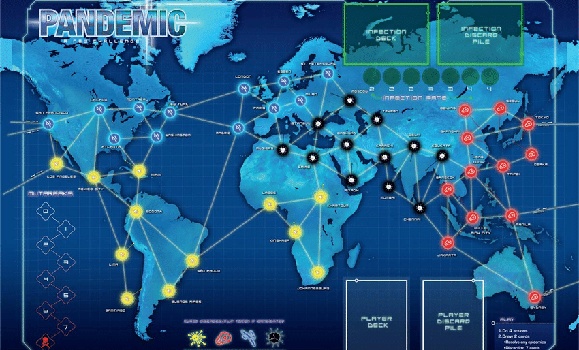Since COVID-19 has pushed the majority of ¬ť∂Ļīę√Ĺ classes online, faculty members have had to rethink, reconfigure and redesign their methods of teaching and course delivery. These new ways of designing their courses have brought on much uncertainties and worries about diving into these unchartered teaching waters, but they also bring opportunities for faculty members to be creative and innovative with the ways they will now design their courses and engage with students.
One such course being taught this fall term is by Robert Huish, associate professor in the Department of International Development Studies in the Faculty of Arts and Social Sciences (FASS). He has designed a course loosely based on the board game (by Z-Man Games). ‚ÄúPandemic! The class‚ÄĚ is a real time simulation-based course on pandemic management with the goal of preventing pandemics from occurring. Őż
Students will take on roles that are based on characters in the game. They must work together and with other groups in order to cure four diseases, while being mindful about the consequences of their actions. Trying to eradicate one disease may allow another to become a pandemic. Putting too much attention into vaccine research can have consequences, as can putting too much attention into quarantines and military medical responses.
Gaming it out
Őż
Dr. Huish, shown left, explains that the idea to design a course based on a board game came to him after reflecting on conversations he had while he was doing research in Fiji last year, where he connected with some board game enthusiasts and designers who knew the big names in the board game design world. They got to chatting about how games are designed, and the types of behaviours that they try to create in the game itself.
‚ÄúWe‚Äôre not talking Monopoly or chess, but rather worker-placement games, cooperative games, and some of the Euro-style board games,‚ÄĚ explains Dr. Huish. ‚ÄúI started to see how the design of these games could fit into educational simulations, especially online.‚ÄĚ
So once the COVID-19 pandemic made its way to Nova Scotia, and it was determined that all courses in FASS would be online for the fall term, Dr. Huish decided to go after this opportunity. He reached out to Matt Leacock, who designed Pandemic the board game, and also to Z-Man games about using the Pandemic game as a simulation for a class on pandemic management. He says they are supportive and curious to see what comes out of this course.
‚ÄúSince the goal is to prevent a pandemic, whereas a lot of the playbooks are about managing pandemics after they kicked off, I figured it a fantastic opportunity and to give it a try.‚ÄĚ
Dr. Huish also saw opportunity to team up with the School of Public Administration for the delivery of this course. He contacted the school’s director, Lori Turnbull, who eagerly agreed to come on board. The course is listed as a Special Topics class between Public Administration and International Development Studies (cross-listed as PUAD6940, INTD4002 and INTD5001).
Bridging policy and play
Dr. Huish says, that from an academic perspective, this course presents a great global snapshot of COVID-19 policy approaches. Students will complete 10 modules that discuss the policy challenges of the COVID pandemic and include podcasts with experts around the world. They will engage with specific COVID-19 events and offer reflective insight on them, giving them a strong sense of the global impacts of the pandemic, and also how the social determinants of health matter in outcomes from public health policy.
‚ÄúAs for the simulation, there will be a strong development of team-collaboration, and intra-team collaboration skills,‚ÄĚ explains Dr. Huish. ‚ÄúI‚Äôd like to think that greater international policy collaboration is something that we can all bring to the fight against pandemics. So many of the COVID-19 policies have been incredibly siloed down nationalist lines, and many of the policies of self isolation, are incredibly ancient.Őż We‚Äôre going to need new policy toolkits and approaches, and ideas going forward.‚ÄĚ
Dr. Huish is excited to offer this course, as it builds on his years of teaching the global health course, and it incorporates a lot of lessons learned about group dynamics from that class. ‚ÄúI hope that students understand that the simulation isn‚Äôt just a game, but that it is a well-designed scenario where epidemics breakout and intensify much as they do in the real world. We‚Äôre not going to beat COVID-19 with this class, but we can normalize policy and management behaviour like collaboration, trust, cooperation, and resolution. Viruses gain a lot of opportunity when people are divided, fearful and panicked. Strong collaborative governance will put the virus in its place.‚ÄĚ Őż
And since the class is about collaboration, Dr. Huish is hoping that this will help build a sense of connection and camaraderie during the pandemic.
Creativity in online teaching
Another benefit that comes from redesigning courses for a virtual environment is it allows for more creativity for faculty members.
‚ÄúSure, it‚Äôs challenging and new, but looking at the potential of the online tools can be really exciting,‚ÄĚ says Dr. Huish. ‚ÄúBrightspace has a lot of great features that can allow faculty to be very creative in the design and implementation of their courses. It is also a space that can foster rich connectivity and feedback between faculty and students. I think that we‚Äôll all benefit from seeing the online learning space as an arena for innovation, not just a digital version of a bulletin board that we would hang in front of our office doors.‚ÄĚ
Dr. Huish thinks that there are incredible opportunities to be had in creative and innovative course design through Brightspace, and that faculty members should take advantage of this opportunity to reimagine course design possibilities. Őż
‚ÄúThe other thing to consider is that online learning platforms won‚Äôt offer innovative tools if professors don‚Äôt ask for them.Őż But if there is a demand for new approaches based on creative approaches to teaching, the learning platform will respond. Őż
‚ÄúBut as with all innovations, time will tell.‚ÄĚ
Őż


